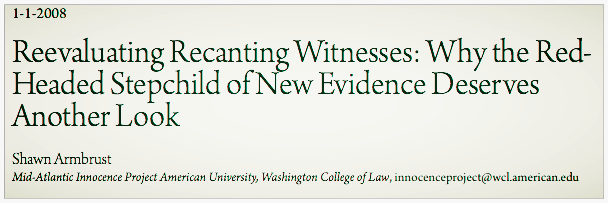Courts have generally disfavored evidence from recanting witnesses. This article examines the standards laid out in Berry v. State and Larrison v. United States that courts use when considering motions for new trials based on new evidence. It next explores some of the reasons courts have disfavored recantations. Recent cases involving DNA exonerations present useful lessons for evaluating recantations and weaken many of the reasons courts have used to reject such evidence. Because DNA evidence is not readily available in most cases, however, the current framework has led to incarceration of innocent defendants. Given these lessons, courts must find new means of assessing the testimony of recanting witnesses. Courts should adopt a modified version of the Larrison standard, which would require corroboration rather than proof of truth. Appellate courts should not apply a deferential standard of review to summary denial of motions for new trials based on recantations.
Read More
![When Money Isn't Enough: The Case for Holistic Compensation of the Wrongfully Convicted]()
Ray Milton Krone graduated in the top ten percent of his high school class and went on to became a sergeant in the United States Air Force. After an honorable discharge, he took a job in Arizona with the United States Postal Service, living a normal, middle-class life. But, in 1991, his life changed. A witness to the murder of bartender Kim Ancona told police that someone named "Ray" was supposed to help Ancona close the bar. Krone had socialized with Ancona in the past and was considered a regular customer at the bar. He immediately became a suspect. At trial, Krone was convicted primarily on this testimony, in addition to that of a bite-mark expert who testified that Krone's bite matched the bite-mark found on the victim.
The Arizona Supreme Court reversed this conviction in 1995 because the prosecution had waited until one day before trial to turn over a crucial video made by their bite-mark expert. Krone was again convicted, however, despite presenting ten DNA and bite-mark experts who testified that he could not have committed the crime. But in 2000, his attorney persuaded a judge to compare DNA samples from the victim's body with those in a database of people convicted of serious crimes. The DNA found on Ancona matched that of a convicted -- and already imprisoned -- sex offender who had lived 600 ...
Read More
